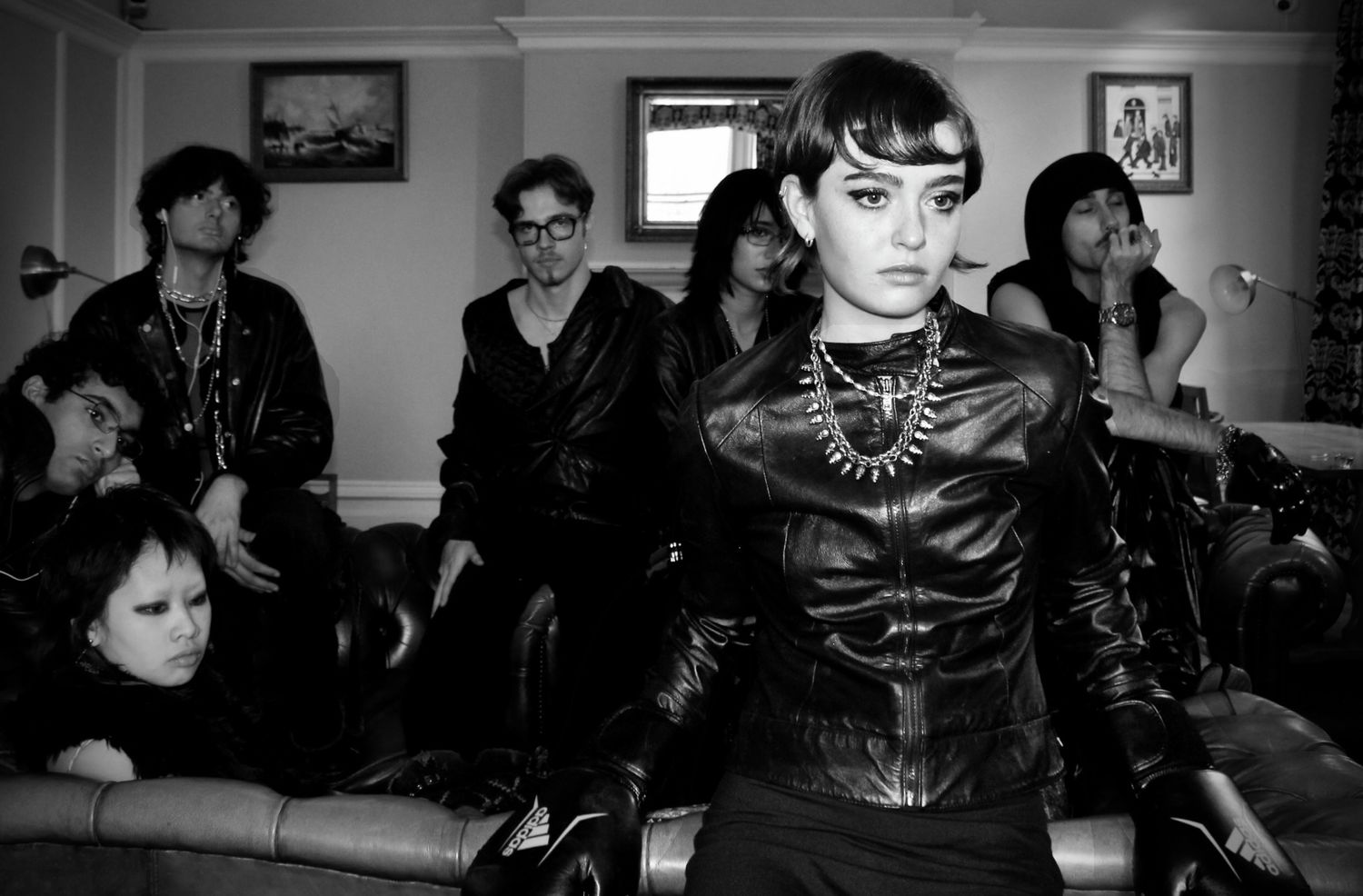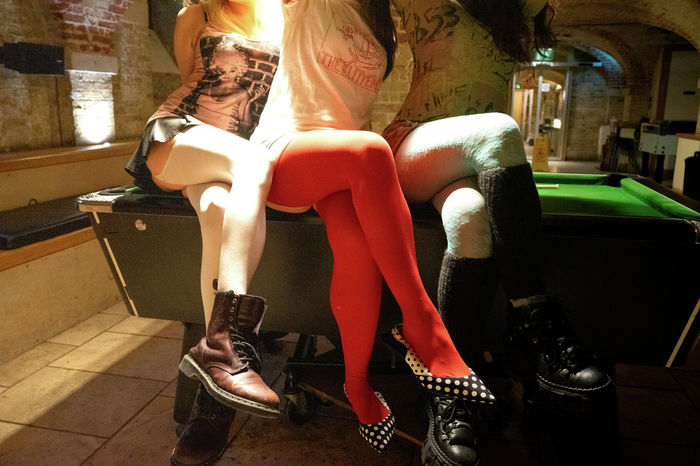On the 29th of November at the Cambridge Union, the proposition will announce the motion that Cambridge nightlife is dull and dead. The opposition, London-based multidisciplinary collective Fetchish, accepts the challenge and will tackle the daunting task of refuting this claim. However, they will not be using speeches – the debate will take place between a line-up of excellent DJs, and the matter will be settled on the dance floor.
Sitting down to chat about the event with Fetchish’s Creative Director Anastasia Kozloca, Creative Producer Zlata Mechentina, and Joanne Yau (Social Events Officer for the Cambridge Union), I am fascinated to hear about the seemingly impossible plight of creating a night out in Cambridge that is actually good. Zlata tells us that Fetchish is “generally interested in subcultures and the discourse they create around themselves which includes the material, anthropology, styles, and the people, of course”, and goes on: “I think the people are the most important part of any party.” Stylistically, Fetchish looks to incorporate a variety of different cultural references and points of inspiration, and everything they are drawn to “comes together as an interesting hybrid, visual monster”. Anastasia affirms that Fetchish has “always been really hybrid, both in kinds of discourses and also the mediums that we’re choosing” – if anyone is equipped for the unusual challenge of bringing a night out to the world’s oldest continually operating debating society, it is Fetchish.
“We encourage people to use their own fantasy and be part of the performance”
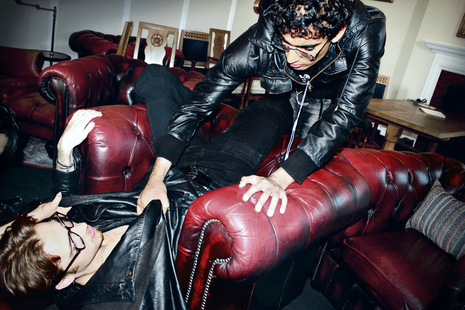
From the perspective of an attendee of Fetchish events, Joanne jumps in to confirm that this approach is very effective. She emphasises the theatricality of a Fetchish night, and describes that the creative space Fetchish gives to its artists allows for “a lot more creative autonomy and freedom for the artist to express themselves – and that translates to the audience feeling more comfortable in that space to express themselves, albeit dance-wise and fashion-wise”. Anastasia and Zlata agree that this relationship between artist and audience is an important and reciprocal one, particularly when it comes to style and visuals. They both stress that fashion is a super important part of a good night out. “Actually I think it’s surprisingly one of the most important things”, Zlata comments, “We encourage people to use their own fantasy and be part of the performance.” Anastasia affirms that, “It’s really cool this way because I think it sparks a lot of inspiration for people to interpret it themselves and elaborate on this fantasy with their outfit choices, or just generally agenda for the night.” It is clear that this focused and nuanced approach to a night out works well, which begs the question: what is it about Cambridge that makes our nights out so lazy? What is it about a Cambridge night that refuses to inspire creative expression?
Although curating good nightlife might feel like it’s a million miles from anything that happens in Cambridge, the origins of Fetchish may be far closer to our academic culture than you think. Zlata explains how Fetchish originated as a project while she was studying at UCL, and how the name came to them after reading Marx’s Communist Manifesto and thinking “yeah, commodity fetishism, that sounds funny enough”. Zlata clarifies that although they were just looking to choose a random name, the presence of politics and academia in the curation of a Fetchish event is significant – even if Anastasia and Zlata have to constantly face the questions “What do you do?”, “Do you do Fetchish” by clarifying, “Yeah I do Fetchish, but it’s nothing about fetishes or kinky stuff … most of the time.”
“The Union is often quite a rigid space in terms of dress code and I would really like to bring some changes to that”
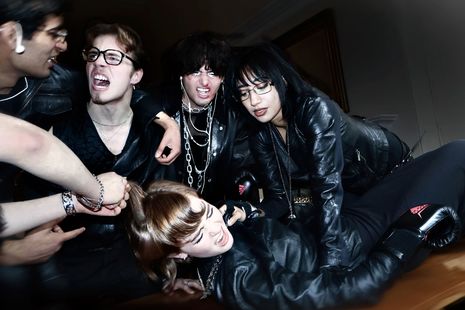
Joanne draws on this as she explains the process of bringing a Fetchish event to the Union. I’m curious as to how the idea for the event – fittingly titled Hardbass Debate – came about, and Joanne explains: “It was when I was running for elections at the Union – one of the promises I put on my manifesto was that I’m going to bring good gigs, good music to the Union.” Reaching out to Fetchish felt instinctive, “I really like this collective and I’ve always enjoyed their gigs in London.” Together with one of the DJs at the event, Andreas Marcou, the more experimental direction of the debate was formed: “The debate idea and conceptualisation of a debate is that it happens behind the decks and on the dancefloor. We’re going to vote on the dance floor – it’s very unusual if you ask me and it’s the first time in forever that sort of thing has happened in the Union.” She goes on to explain to us how this will affect the stylistic direction of the event, recalling that “I was quite insistent on having the dress code as ‘anything but black tie’, because the Union is often quite a rigid space in terms of dress code and I would really like to bring some changes to that”. In a city where you will frequently see suits and formal gowns in the club, it seems that the night’s aesthetics will be just as excitingly new for the Union as its contents.
“This perception of the world as a huge rhizomatic system where you can see so many patterns being traced across completely different subjects and time periods”
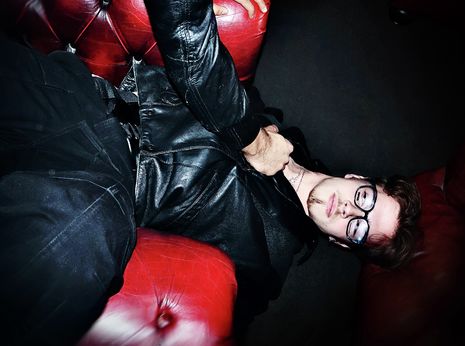
That is not to say there isn’t a prominent overlap between the words of academia and clubbing or hardbass. Anastasia reflects on the first moodboard the collective created, a crazy assortment of personal pictures, stuff they found from the internet, stuff from movies, and the literary theory of Mikhail Bakhtin. She goes on to explain the importance of this eclectic initial approach: “I feel like both me and Zlata as collaborators are quite educated people – let’s say – and I guess we’re striving to discover our intelligence, and we’re also chronically online. So I think this creates this perception of the world as a huge rhizomatic system where all the things are connected and where you can see so many patterns being traced across completely different subjects and time periods.” Spotting these thought-provoking patterns is their first step in creating a Fetchish event, before eventually bringing together references from pop media and culture to “[create] a visual system that I guess will eventually be connected with the initial idea”. This approach which Anastasia describes as “overanalytical” is key to a Fetchish night, and seems remarkably fitting for a university audience to me.
In organising Hardbass Debate for the Union, Anastasia and Zlata are bringing post-Soviet hardbass aesthetics from Eastern Europe to a notably formal Cambridge University context. The case to be made (while adorned in an Adidas tracksuit) is that being intellectual should not preclude you from clubbing and enjoying yourself – and clubbing should not preclude you from being an intellectual, either. As Zlata explains “I think, because we started in academia, it’s quite a funny way around. We made a full circle and came back”. If Anastasia and Zlata can draw so many disparate worlds together with Fetchish, so can every aspiring academic (or clubber) at Cambridge, and Hardbass Debate at the Cambridge Union is an excellent place to start.

